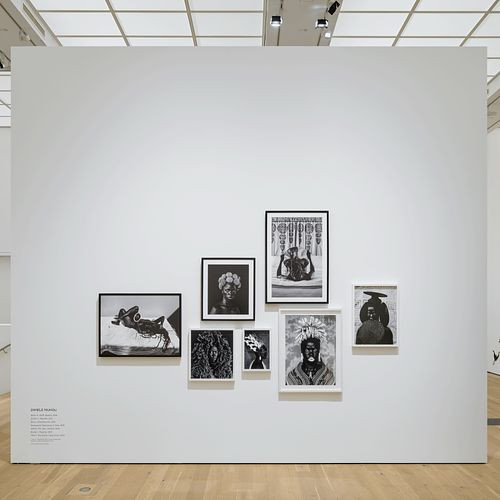AUDIO
Zanele Muholi
At the very beginning of the exhibition, you encounter a monumental portrait entitled Faniswa, Seapoint, Cape Town. Over 4 meters high, the picture takes up almost the entire wall. It’s more than just eye-catching—it makes a deliberate statement. The title of the exhibition, Magical Women, initially evokes classical, perhaps even stereotypical notions of femininity. Muholi, on the other hand, is nonbinary and describes themself as a queer artist and activist.
The portrait belongs to the series Somnyama Ngonyama, which translates as “Hail the Dark Lioness.” In this series, Muholi takes portraits of themself in changing roles, using everyday objects as props. In Faniswa, a voluminous headdress made of feather dusters reminds us of African hairstyles or ceremonial headgear. Muholi’s shoulders are naked, their gaze direct, serious, self-confident.
Muholi’s black-and-white photography emphasizes strong contrasts, and they have digitally manipulated their skin to make it look particularly dark—a deliberate reference to colonial and racist visual traditions such as blackface. Instead of reproducing such traditions, however, Muholi uses their aesthetics to raise questions about representation, power, and visibility.
The eight photographs on display here, along with the others in the series, take on the issues of racism, colonialism, and social inequality—in South Africa and beyond. Muholi uses many objects familiar from everyday housekeeping as props, reminding viewers of the work often performed by Black women as servants. Under apartheid, the artist’s mother also worked as a housekeeper.
The exhibition begins with these images—and raises possible questions: Who is actually seen? And who do we mean when we talk about “magical women”?
Later on, other artists also take up these questions—for example, Mary Beth Edelson, whose photographs and collages, placed directly opposite Muholi’s photographic mural, use completely different means but functions in an equally body-oriented manner.
The portrait belongs to the series Somnyama Ngonyama, which translates as “Hail the Dark Lioness.” In this series, Muholi takes portraits of themself in changing roles, using everyday objects as props. In Faniswa, a voluminous headdress made of feather dusters reminds us of African hairstyles or ceremonial headgear. Muholi’s shoulders are naked, their gaze direct, serious, self-confident.
Muholi’s black-and-white photography emphasizes strong contrasts, and they have digitally manipulated their skin to make it look particularly dark—a deliberate reference to colonial and racist visual traditions such as blackface. Instead of reproducing such traditions, however, Muholi uses their aesthetics to raise questions about representation, power, and visibility.
The eight photographs on display here, along with the others in the series, take on the issues of racism, colonialism, and social inequality—in South Africa and beyond. Muholi uses many objects familiar from everyday housekeeping as props, reminding viewers of the work often performed by Black women as servants. Under apartheid, the artist’s mother also worked as a housekeeper.
The exhibition begins with these images—and raises possible questions: Who is actually seen? And who do we mean when we talk about “magical women”?
Later on, other artists also take up these questions—for example, Mary Beth Edelson, whose photographs and collages, placed directly opposite Muholi’s photographic mural, use completely different means but functions in an equally body-oriented manner.
